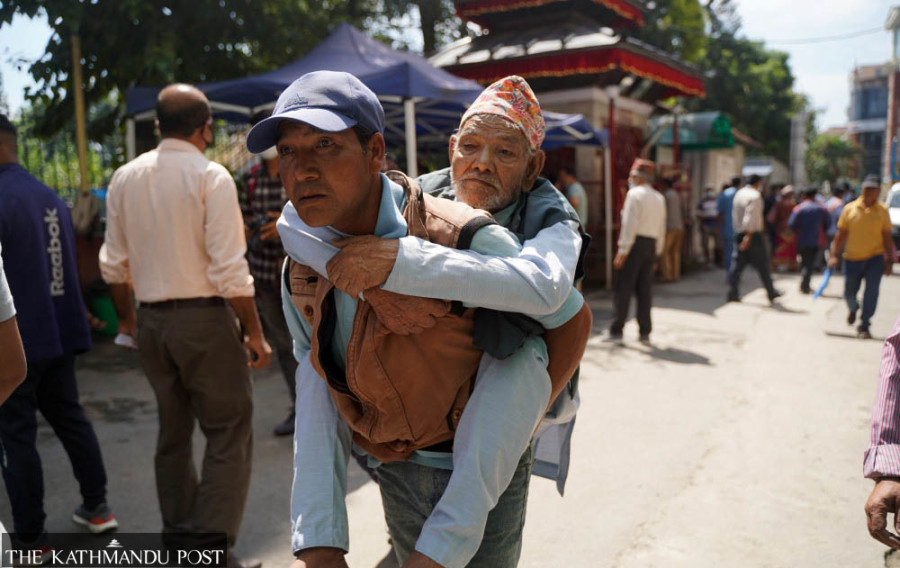Health
Thousands of patients suffer due to doctors’ strike
Medical professionals to resume duty after an agreement with the government on Sunday evening.
Arjun Poudel
Sankha Bahadur Rokaya, 40, from ward 1 of Sinja Rural Municipality in Jumla district, reached Bir Hospital on Sunday morning as a ureteral stent inserted by doctors to drain urine had been blocked and he was in severe pain.
Rokaya, however, could not meet the doctors, as they were busy enforcing the strike called by the Nepal Medical Association, their umbrella organisation.
“I am currently in severe pain,” Rokaya said. “I even tried to meet the doctors at the hospital’s emergency, but they said only the doctor who had inserted the stent should see me. Neither can I eat nor drink.”
Like Rokaya, thousands of patients seeking care at state-run health facilities faced difficulties on Sunday when they found that all hospital services, except for emergencies, had been shut down.
The Nepal Medical Association (NMA), an umbrella organisation of medical and dental doctors, announced a halt of healthcare services in protest against a physical attack on two of its members by the relatives of a patient who had succumbed during the course of treatment.
Dr Prashanta Bidari and Dr Bikash Thapa, serving at Hetauda-based Sancho Hospital, were thrashed a month after the death of the patient, with perpetrators alleging sheer negligence in the treatment. Police on Thursday arrested the wife, daughter, son, and nephew of the deceased for being involved in the assault.
The association often halts medical services to pressure the authorities when its members get assaulted.
In the second week of February, the Association had called a nationwide strike in protest against the assault on a doctor by police for walking on the road during a temporary ban on movement to make way for a presidential convoy.
Rokaya, who has been suffering from ureteral obstruction caused by kidney stones, complained that he had been making rounds of the hospital for the last month and a half for treatment, but had still not received a surgery date.
“I knew that the doctors had announced a boycott of the services, but I am in constant pain and came here hoping that some doctors would empathise with my suffering,” said Rokaya.
Doctors informed him that there was a 39 mm stone in his right kidney and a 37 mm stone in his left kidney and that he needed to undergo surgery. Rokaya said that he had already spent Rs150,000 in the last month and a half for treatment and is now running low on cash.
Hundreds of other patients seeking treatment at the hospital had their own tales of pain and suffering.
Harka Bahadur Kumal, 77, a local from Siranchowk Rural Municipality of Gorkha, came to Kathmandu on Friday for the treatment of his 78-year-old wife Dil Maya, who has been suffering from constant pain all over her body.
“There was no service (yesterday) Saturday and the doctors did not come today (Sunday) either,” said Kumal. “ We don’t know how long it would take for the services to resume.”
Sher Bahadur Tamang from Tarakeshwar Municipality in Kathmandu, came to the hospital for treatment of vascular problems of his ailing daughter-in-law. He complained that by halting healthcare services, doctors had done a great injustice to patients.
“How can one justify the move by depriving thousands of ailing patients of their rights to healthcare services?” he questioned.
Some doctors from the medical fraternity expressed their disagreement with the nationwide disruption of hospital services.
“I don’t agree with the decision to deprive thousands of patients of healthcare services from one incident,” said Dr Bhagawan Koirala, chairman of the Nepal Medical Council. “But that doesn't mean a doctor’s security should be compromised.”
Meanwhile, NMA President Dr Anil Bikram Karki claimed that the nationwide shutdown of hospital services was not a choice but a compulsion of doctors to make the government heed their concerns.
“First of all, police have not arrested all those involved in the incident,” said Karki. “Secondly, despite a law in place, violence against doctors has not stopped and the authorities concerned do not appear serious about enforcing the law.”
The association said the workplace violence against doctors will not stop unless the patient-doctor ratio is adequately addressed. The association has also called for setting up a hospital security force to promptly resolve disputes between relatives of patients and doctors.
When asked about the problems faced by patients across the country, Karki said hundreds of patients have been waiting in queue for surgery, for several years, at state-run hospitals.
Thousands of patients, especially those who cannot afford expensive treatment at private healthcare facilities visit state-run hospitals, where services are provided at comparatively cheaper rates.
Meanwhile, talks the NMA has called off its protest on Sunday evening after signing a six-point agreement with the Health Ministry.
As per the agreement, the government has promised to take action against those involved in last week’s assaults on doctors in Hetauda, as per the Security of Health Workers and Health Organisation Act-2066. Likewise, they have agreed to effectively implement the Act to prevent similar attacks in the future. Similarly, the government has also agreed, among other things, to draft a new medical service bill for the safety, security and better training of doctors.




 13.12°C Kathmandu
13.12°C Kathmandu















